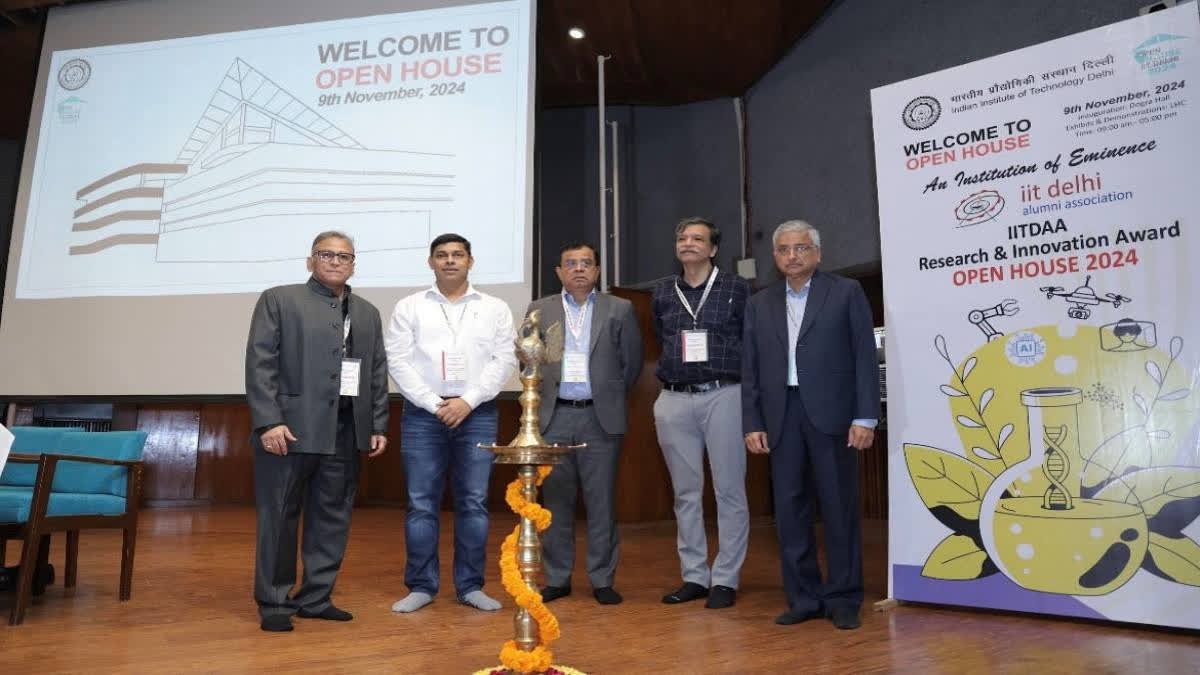New Delhi: The Indian Institute of Technology Delhi (IIT Delhi) recently hosted the 17th edition of its annual 'Open House,' an event dedicated to sparking curiosity and inspiring young minds toward science and technology. This year, the Open House saw an unprecedented response, with around 3,500-4,000 students from 58 schools and colleges across Delhi-NCR attending. Teachers and the general public joined in making the event a grand showcase of IIT Delhi’s contributions to national development through research and innovation.
The Open House provided a window into IIT Delhi’s pioneering research projects, innovative student work, and cutting-edge facilities. Attendees were introduced to advanced labs and interacted with IIT Delhi’s faculty and students, gaining insight into the institution’s role as a hub for knowledge and technological progress.
In an interview with ETV Bharat, Ashwin Yadav, a B Tech graduate from Harcourt Butler Technical University and a recipient of pre-seed funding from IIT Delhi, shared details about his innovative project, which won him second prize. “We developed an assistive technology-based Artificial Intelligence eye for the blind,” he said. The device aims to assist visually impaired individuals by enabling them to walk independently, read, interpret others’ behaviour, and interact with their surroundings.
“This device has the potential to transform the lives of blind people, making them as autonomous as those with sight,” he explained. Ashwin also shared that the device is expected to hit the market within a year, priced at around Rs 20,000.
Prof Rangan Banerjee, Director of IIT Delhi, discussed the institution’s commitment to expanding its impact beyond science and engineering to areas like healthcare and social sciences. “We began with a focus on science and engineering, and while we maintain that, we are also making strides in healthcare and social sciences. We are collaborating with AIIMS and have started a Centre of Excellence for AI in Healthcare. Our goal is to create future generations, who will make a significant impact on the country and the world,” he remarked.
Prof Randeep Guleria, former Director of AIIMS New Delhi, inaugurated the event and delivered an inspiring talk on “Healthcare: A Look Back, a Look Ahead.” Prof Guleria highlighted the convergence of various disciplines, emphasising that the future of science and technology would require thinking beyond traditional boundaries. “We need to move away from our silos,” he stated, “In the future, it won’t be just engineering, computation, or medicine in isolation. These fields will converge into a larger area, allowing for more holistic ideas to serve humanity.”
The guest of honour, Rajat Mishra, Director and CEO of EFKON India Group and a 1989 IIT Delhi alumnus, delivered a talk on 'Children: The Agents of Change.' A dedicated social entrepreneur involved in initiatives on road safety, education and environmental sustainability, Mishra encouraged young participants to pursue passion over fashion and dream fearlessly. “Leadership requires resilience,” he told the students, “and failure should not deter you from your goals.”
Prof Naresh Bhatnagar, Dean at IIT Delhi, praised the event’s growth and the renewed enthusiasm for science among students, especially after the COVID-19 pandemic. He noted that school participation had doubled, reflecting a strong interest in science and technology among young students. With IIT Delhi at the forefront of AI in healthcare, and actively participating in India’s Quantum and Semiconductor Mission, the Open House focused on inspiring curiosity in these critical fields.
